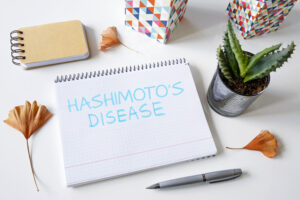
According to the National Institutes of Health, roughly 5% of Americans have been diagnosed with hypothyroidism, and many more remain undiagnosed. Of the millions of people with hypothyroidism, the majority have a much more important diagnosis of autoimmune disease: Hashimoto’s Thyroiditis.
Hashimoto’s is the leading cause of low thyroid in this country, and although we think of it as a “thyroid” disease, it’s more accurate to call it an immune system disease. When you have an autoimmune disease, your white blood cells create antibodies that target your own tissues just like they would a virus or bacteria. In this case, you begin making thyroid peroxidase antibodies (anti-TPO) and sometimes thyroglobulin antibodies (anti-Tg) which attack your thyroid gland, slowly destroying the cells and leading to hypothyroidism. So let’s suppose you’ve been diagnosed with Hashimoto’s Thyroiditis and given the standard treatment, Synthroid. Perhaps you were told that nothing more can be done, and there’s no point in tracking antibody levels. If you feel fantastic, this approach may work for you. If you are like the majority of my patients with Hashimoto’s and it’s been years since you felt “normal,” it’s time for a new approach.Ready to take control of your Hashimoto’s Disease?
Here’s where you start:
Get a Full Thyroid Panel- Basic thyroid screenings are not enough after a Hashimoto’s diagnosis. Your thyroid stimulating hormone (TSH) can fluctuate within “normal” for years, all the while you may be experiencing both hyper- and hypo- symptoms. We can treat these symptoms before your TSH goes out of range. When you go in for your standard TSH test, ask for a free T4, free T3, reverse T3, and both anti-TPO and anti-TG antibodies.
Check Your Nutrients- Deficiencies in nutrients such as selenium, iodine, and vitamin D can worsen your thyroid condition. Make sure you screen for deficiencies and supplement when appropriate. Ask your physician before starting iodine, as too much can worsen your symptoms if taken at the wrong time.
Try Another Form of Thyroid Medication- Synthroid, also known as Levothyroxine, is an inactive T4 thyroid hormone that works well for some, and horribly for others. If it’s not the right fit for you, taking it won’t help with your symptoms. Sometimes it actually makes you feel worse. A combination of T4 and T3 (active thyroid hormone) may be a better fit, either as separate prescriptions, a compounded pill, or a prescription thyroid glandular pill.
Eat Foods That Support Your Thyroid- Boost your anti-inflammatory omega 3 levels with wild-caught salmon, flaxseed, walnuts, and hemp seeds. To get enough tyrosine for making your thyroid hormones, eat extra avocado, tahini, poultry, and pumpkin seeds. Natural dietary sources of iodine contain much lower doses of the essential nutrient and can be a healthy part of your diet. These include fresh fish, shellfish, eggs, poultry, and in moderation, seaweed.
Clean Up Your Gut- Over two-thirds of your immune cells live in your gut. If your digestive tract is unhappy, so is your immune system. Food sensitivities, overgrowth of bad bacteria, and gut hyper-permeability (“leaky gut”) can all wreak havoc. As you treat these things, you can retest thyroid antibody levels to see if they begin dropping.
Support Your Adrenals- Chronic stress fuels autoimmune disease. Reducing stress in our lives is ideal, but not always feasible. There are things that can be done to support your adrenal glands which enhances your capacity to handle stress and control inflammation. This includes adaptogenic (balancing) herbs like ashwagandha, replenishing essential vitamins used by your adrenal glands, and sometimes taking bioidentical adrenal hormones.
Cut Out Gluten- For many patients with Hashimoto’s Thyroiditis, they notice feeling worse after eating gluten. This may be because proteins in gluten look similar to certain proteins in your thyroid tissue. Remember all of those immune cells that live in your gut? If they are producing thyroid antibodies and start mistaking gluten for more thyroid tissue to attack, it fuels that inflammatory pathway. Make sure you get tested for Celiac Disease before going fully gluten-free long term since people with Hashimoto’s are more likely to develop this as well.
